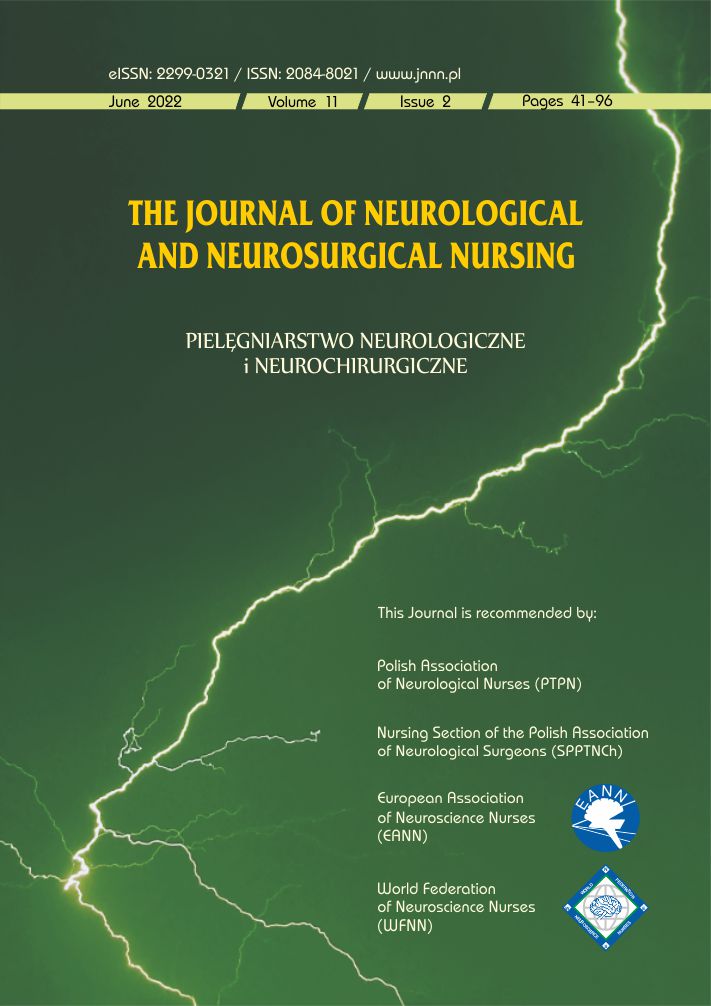Występowanie zdarzeń niepożądanych w obszarze administrowania lekami w praktyce pielęgniarskiej
DOI:
https://doi.org/10.15225/PNN.2022.11.2.4Słowa kluczowe
zdarzenia niepożądane, administrowanie lekiem, błędy medyczne, personel pielęgniarski, farmakoterapia, prewencja, raportowanie ZN, bezpieczeństwoAbstrakt
Wstęp. Zdarzenia niepożądane (ZN) w procesie farmakoterapii mogą prowadzić bezpośrednio do uszczerbku na zdrowiu bądź utraty życia pacjenta. Czynniki prowadzące do ZN dzieli się na ludzkie i systemowe. Najistotniejsze czynniki systemowe to znaczny niedobór personelu pielęgniarskiego oraz stres, zmęczenie i ogólnie pojęty Zespół Wypalenia Zawodowego. Jednym z koronnych filarów prewencji zdarzeń niepożądanych w administrowaniu lekami w pracy pielęgniarskiej jest raportowanie o ZN.
Cel. Celem prowadzonego badania była analiza czynników prowadzących do ZN w procesie farmakoterapii oraz przedstawienie propozycji rozwiązań, które mogą zapobiec ich występowaniu.
Materiał i metody. W badaniu wzięło udział 100 pielęgniarek/pielęgniarzy zatrudnionych na różnych oddziałach szpitalnych. W sondażu został wykorzystany autorski formularz ankiety złożony z siedmiu pytań zamkniętych, który opracowano w oparciu o badania “The attitudes and beliefs of healthcare professionals on the causes and reporting of medication errors in a UK Intensive care unit”. Badania przeprowadzono w okresie od stycznia do kwietnia 2020 r.
Wyniki. Szczegółowa analiza zgromadzonego materiału pozwoliła stwierdzić, że najistotniejszymi czynnikami wpływającymi na występowanie błędów w obszarze administrowania lekami jest, zbyt mała liczba personelu pielęgniarskiego na dyżurach (14%), stres i presja czasu (11%), złe oznakowanie etykiet (13%). Ponad 85% badanych mimo braku rejestru zdarzeń niepożądanych w swoim miejscu pracy zaistniałą pomyłkę związaną z podaniem leku zgłosiła pozostałym członkom zespołu terapeutycznego. Testy z wykorzystaniem testu Kruskala–Wallisa nie potwierdziły istnienia zależności pomiędzy zmiennymi: występowanie zdarzeń niepożądanych w obszarze farmakoterapii a wiek (K – W = 0; p = 1), poziom wykształcenia (K – W = 3,6328; p = 0,3039) oraz staż pracy badanych respondentów (K – W =0,3651484; p = 0,5457). Podobnie nie wykazano istotnych zależności pomiędzy występowaniem zdarzeń niepożądanych a profilem oddziału (K – W = 0,330; p = 0,5652).
Wnioski. Analiza dostępnego piśmiennictwa a także wyniki przeprowadzonych badań własnych pozwoliły na sformułowanie następujących wniosków: poziom wykształcenia, staż pracy w zawodzie oraz wiek nie mają istotnego związku z popełnianiem błędów w obszarze administrowania lekami; czynnikami, które istotnie wpływają na występowanie ZN w obszarze administrowania lekami są: zmniejszona obsada pielęgniarska na dyżurach, wykonywanie swoich obowiązków w stresie i pod presją czasu, zbyt mała różnorodność etykiet produktów leczniczych; najlepszym sposobem profilaktyki w obszarze zarządzania lekiem i jego administrowania jest obecność systemu raportowania i monitorowania; zdecydowana liczba badanych pielęgniarek zawsze raportowała występowanie zdarzenia niepożądanego związanego z lekiem pozostałym członkom zespołu terapeutycznego. (PNN 2022;11(2):65–73).
Bibliografia
Głowacka M., Rezmerska L., Kochman D., Soleta A. Zdarzenia niepożądane w praktyce zawodowej pielęgniarek anestezjologicznych i intensywnej opieki. J Publ Health Nurs Med Rescue. 2012;2:22–31.
Szpakowski R., Dykowska G. Ewaluacja punktów krytycznych procesu farmakoterapii szpitalnej w kontekście bezpieczeństwa pacjenta w Polsce. Piel Zdr Publ. 2017;7(4):313–316.
Jaworek M. Czynniki związane z pracą a zespół zmęczenia skumulowanego w grupie zawodowej pielęgniarek. W: Wawak T. (Red.), Komunikacja i jakość w zarządzaniu. Tom 1, Wydawnictwo Uniwersytetu Jagiellońskiego, Kraków 2010;143–152.
Kryst L. Zdarzenia niepożądane i błędy medyczne w opiece zdrowotnej. Bezpieczeństwo Pracy. 2011;11:22–23.
Tromp M., Natsch S., van Achterberg T. The preparation and administration of intravenous drugs before and after protocol implementation. Pharm World Sci. 2009;31(3):413–420.
Saja K. Deontologia (deontologizm etyczny). http://etykapraktyczna.pl/encyklopedia/deontologia [dostęp: 15.04.2020].
Ong W.M., Subasyini S. Medication errors in intravenous drug preparation and administration. Med J Malaysia. 2013;68(1):52–57.
Korytkowska D. Pojęcie błędu medycznego i zdarzenia medycznego. Acta UL Fol Oecon. 2012;274:61–70.
Rodziewicz T.L., Houseman B., Hipskind J.E. Medical Error Reduction and Prevention. StatPearls Publishing, 2022. Retrieved April 10, 2020, from https://www.ncbi.nlm.nih.gov/books/NBK499956/.
Sanghera I.S., Franklin B.D., Dhillon S. The attitudes and beliefs of healthcare professionals on the causes and reporting of medication errors in a UK Intensive care unit. Anaesthesia. 2007;62(1):53–61.
Głowacka M., Orzoł A., Soleta A. Obciążenia zawodowe w praktyce pielęgniarek anestezjologicznych i intensywnej opieki. J Publ Health Nurs Med Rescue. 2012;4:5–13.
Marczewska S., Kopański Z. Błąd medyczny związany z wykonywaniem zawodu pielęgniarki. J Publ Health Nurs Med Rescue. 2012;4:14–21.
Zięzio K. Bezpieczna farmakoterapia w opinii pielęgniarek. Probl Pielęg. 2008;16(1–2):106–111.
Zarea K., Mohammadi A., Beiranvand S., Hassani F., Baraz S. Iranian nurses’ medication errors: A survey of the types, the causes, and the related factors. Int J Afr Nurs Sci. 2018;8:112–116.
Alsulami S.L., Sardidi H.O., Almuzaini R.S. et al. Knowledge, attitude and practice on medication error reporting among health practitioners in a tertiary care setting in Saudi Arabia. Saudi Med J. 2019;40(3):246–251.
Pobrania
Opublikowane
Jak cytować
Numer
Dział
Licencja

Utwór dostępny jest na licencji Creative Commons Uznanie autorstwa – Bez utworów zależnych 4.0 Międzynarodowe.
Statystyki
Liczba wyświetleń i pobrań: 646
Liczba cytowań: 0
